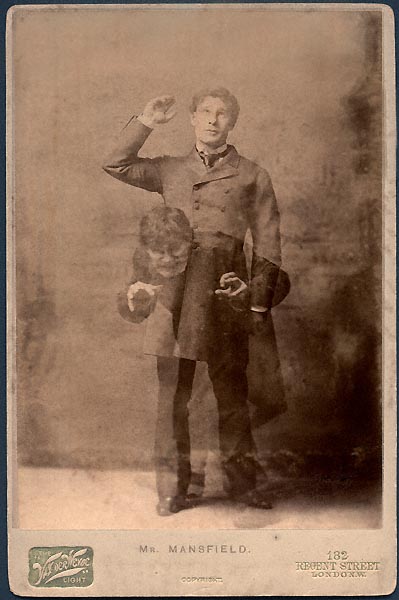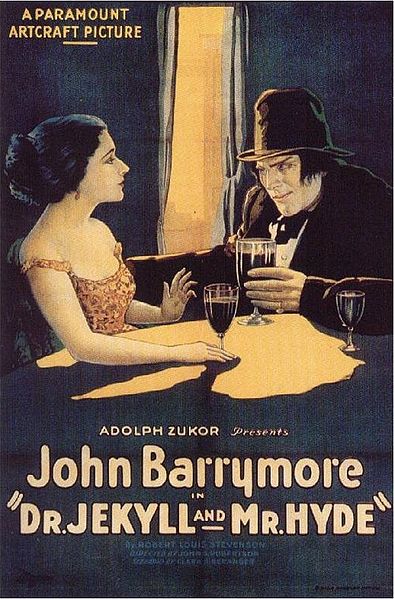Dr Jekyll and Mr Hyde

“If I am the chief of sinners, I am the chief of sufferers also.”
Strange Case of Dr Jekyll and Mr Hyde is a Gothic novella by Scottish author Robert Louis Stevenson, first published in 1886. The work is also known as The Strange Case of Dr. Jekyll and Mr. Hyde, Dr. Jekyll and Mr. Hyde, or simply Jekyll and Hyde. The novella follows Gabriel John Utterson, a London legal practitioner who investigates a series of strange occurrences between his old friend, Dr. Henry Jekyll, and a murderous criminal named Edward Hyde. It is revealed at the end of the novella that Jekyll and Hyde are the same person, with Jekyll transforming into Hyde via an unnamed chemical concoction to live out his darker urges.
Strange Case of Dr Jekyll and Mr Hyde is one of the most famous pieces of English literature and is considered to be a defining book of the gothic horror genre. The novella has also had a sizable impact on popular culture, with the phrase “Jekyll and Hyde” being used in vernacular to refer to people with an outwardly good but sometimes shockingly evil nature.
Dr. Jekyll
The elderly gentleman who struggles with the dual nature of his personality. Although very kind and friendly to his friends, Dr. Jekyll has a dark side which he chooses to express in the person of Mr. Hyde. Although he valiantly tries to keep Mr. Hyde bottled up inside, eventually the dark side of his personality wins, threatening his well-being and even his life.
Mr. Hyde
The ugly sadistic man who commits the acts of brutality and murder throughout the story. Mr. Hyde is created when Dr. Jekyll drinks a special chemical solution, subsequently turning himself into this other creature. Mr. Hyde is hated by everyone he meets, even at first glance. Although they can’t name it, those around him sense something profoundly evil about his demeanor.
Epic Monsters: Dr. Jekyll & Mr. Hyde (5E)
“I learned to recognise the thorough and primitive duality of man; I saw that, of the two natures that contended in the field of my consciousness, even if I could rightly be said to be either, it was only because I was radically both.” Doctor Jekyll & Mister Hyde!
We all know this classic literary classic! An aspiring alchemist that concocted a mixture which transforms him into a freakish monster with an alter ego, unleashing the evil and foulness in his inner soul. At first he does it for kicks but soon begins changing in his sleep and beyond his control, ultimately committing suicide to bring an end to the torturous existence he’s made for himself–or maybe he doesn’t. It’s unclear! You can read the book in its entirety here at Project Gutenberg and figure it out on your own.
Dr. Jekyll
Medium humanoid (human), chaotic neutral
Armor Class 14 (studded leather)
Hit Points 28 (5d8+5)
Speed 30 ft.
| STR | DEX | CON | INT | WIS | CHA |
| 9 (-1) | 14 (+2) | 12 (+1) | 16 (+3) | 13 (+1) | 15 (+2) |
Saving Throws Con +3, Int +6
Skills Arcana +6, History +6, Investigation +6, Medicine +4, Nature +6; alchemist’s supplies +9, thieves’ tools +6, tinker’s tools +6
Senses darkvision 60 ft., passive Perception 11
Languages English, French, Latin
Challenge 2 (450 XP)
Alchemists Formulas. Dr. Jekyll knows how to use his Inventor’s Sack in order to fuel the following features:
- Alchemist’s Fire. Dr. Jekyll uses an action to pull out a vial he throws at a target within 30 feet. All creatures and objects within a 5-foot radius of where it hits make a DC 14 Dexterity saving throw or take 2d6 fire damage.
- Acid Flask. Dr. Jekyll uses an action pull out a vial he throws at a target within 30 feet. All creatures within a 5-foot radius of where it hits make a DC 14 Dexterity saving throw or take 3d6 acid damage. Objects in the area take 18 acid damage.
- Healing Tincture. Dr. Jekyll uses an action to pull out a curative tincture. A creature that drinks it regains 3d8 hit points. A creature can only benefit from Healing Tincture once per long rest. The tincture vanishes after 1 hour or being drunk (whichever comes first). Dr. Jekyll can only have 1 healing tincture at a time.
- Stepping Potion. Dr. Jekyll uses a bonus action to pull out a potion of swiftness. A creature that drinks it gains a 20 foot bonus to Speed for 1 minute. The potion vanishes after 1 minute or being drunk (whichever comes first). After using Stepping Potion, Dr. Jekyll cannot do so again for 1 minute.
Attuned. Dr. Jekyll can attune to up to four magic items at a time.
Enchanted Item Research. Dr. Jekyll knows detect magic and identify, and can cast them as rituals (in which case no material component is required).
Feat: Alchemy. Dr. Jekyll can use an action to identify a potion within 5 feet (as if he tasted it) so long as he can see the liquid. In addition, over the course of a short rest he can use alchemists’ supplies to improve a healing potion. If drunk before 1 hour has passed, the improved healing potion restores the maximum amount of hit points it can heal.
Inventor’s Sack. Dr. Jekyll has a bag filled with the reagents he needs to do alchemy but if he ever loses it, it takes him 3 days of workings 8 hours each day as well as 100 gp of raw materials to replace it.
Magic Items. Dr. Jekyll has crafted and owns goggles of night and robe of useful items.
Magic Inventions. Dr. Jekyll can cast an artificer spell with a casting of 1 action over the course of 1 minute instead, expending a spell slot and casting the spell into one mundane item that is not holding a spell. A creature with an Intelligence of 6 or higher that is holding the object can use an action to activate the spell inside (spell save DC 14 or spell attack +6) within 8 hours of Dr. Jekyll’s casting. An area of effect spell targets the item holding it. Dr. Jekyll can have up to 3 Magical Inventions at one time.
Spellcasting. Dr. Jekyll is a 5th-level spellcaster that uses Intelligence as his spellcasting ability (spell save DC 14; +6 to hit with spell attacks). Dr. Jekyll knows the following spells prepared from the inventor’s spell list:
1st-level: detect magic, false life, identify, jump, longstrider
Transformation. When Dr. Jekyll takes a long rest, roll 1d20. On a result of 10 or above, he transforms into Mr. Hyde (see below). He can also cause this transformation by injecting himself with a special serum. When he is knocked unconscious or killed, or at the end of a short or long rest, Dr. Jekyll reverts to his regular form. While he is transformed, the following rules apply:
- Dr. Jekyll’s game statistics are replaced by Mr. Hyde’s statistics. He retains all of his skill proficiencies, in addition to gaining those of the creature, but he recalculates bonuses.
- When Dr. Jekyll transforms, he assumes Mr. Hyde’s hit points and Hit Dice. When he reverts to his normal form, he returns to the number of hit points he had before he transformed. However, if Dr. Jekyll reverts as a result of dropping to 0 hit points, any excess damage carries over to his normal form and he is knocked unconscious.
- Dr. Jekyll’s equipment is worn by Mr. Hyde, though it may not be intact after the transformation. Other equipment functions as normal, but the GM decides whether it is practical for the new form to manipulate a piece of equipment. Dr. Jekyll’s equipment doesn’t change size or shape to match his new form, and any equipment that the new form can’t wear falls to the ground.
ACTIONS
Dagger. Melee or Ranged Weapon Attack: +5 to hit, reach 5 ft. or range 20/60 ft., one target. Hit: 4 (1d4+2) piercing damage.
Light Crossbow. Ranged Weapon Attack: +5 to hit, range 80/320 ft., one target. Hit: 6 (1d8+2) piercing damage.

Mr. Hyde
Large humanoid, chaotic evil
Armor Class 16 (natural armor)
Hit Points 92 (8d10+48)
Speed 45 ft.
| STR | DEX | CON | INT | WIS | CHA |
| 25 (+7) | 15 (+2) | 22 (+6) | 8 (-1) | 13 (+1) | 12 (+1) |
Saving Throws Str +10, Con +9
Skills Arcana +2, Athletics +10, History +2, Intimidation +4, Investigation +2, Medicine +4, Nature +2, Perception +4; alchemist’s supplies +5, thieves’ tools +5, tinker’s tools +2
Damage Resistances bludgeoning, piercing, slashing
Senses darkvision 60 ft., passive Perception 14
Languages English
Challenge 8 (3,900 XP)
Assured Strength. Mr. Hyde has advantage on Strength ability checks and saving throws. When Mr. Hyde makes a Strength ability check or saving throw, he can treat a d20 roll of 9 or lower as a 10.
Big-Handed Grappling. Mr. Hyde has advantage on attack rolls against a creature he is grappling and he can use an action to try to pin a creature he’s grappled. To do so, Mr. Hyde makes another grapple check. If he succeeds, the creature is restrained until the grapple ends. Mr. Hyde only needs one hand to grapple a creature of Medium size or smaller.
Incredible Might. Mr. Hyde can lift up 2 tons or more though doing so requires his full attention and concentration. At the GM’s discretion, he can lift (and likely throw) virtually anything he can touch and only requires additional actions to do so when an object’s weight exceeds 1 ton.
Leap. Mr. Hyde increases the distances of his horizontal jumps by 30 feet and his vertical jumps by 20 feet.
Regeneration. Mr. Hyde regains 5 hit points at the start of his turn. Mr. Hyde goes unconscious only if he starts his turn with 0 hit points and doesn’t regenerate.
Siege Monster. Mr. Hyde deals double damage to objects and structures.
Transformation. When Mr. Hyde is knocked unconscious, or at the end of a short or long rest, he reverts to his regular form (Dr. Jekyll; see above).
ACTIONS
Multiattack. Mr. Hyde attacks with smash three times or throws an object.
Smash. Melee Weapon Attack: +10 to hit, reach 10 ft., one target. Hit: 14 (2d6+7) bludgeoning damage.
Thrown Object. Ranged Weapon Attack: +5 to hit, range 250/500 ft., multiple targets (determined by object size; make one attack roll per target). Hit: 11 (1d8+7) damage. The damage type depends on the object (bludgeoning, piercing, or slashing) and at 100 pounds and every 100 pounds thereafter, the damage increases by 1d8 (up to a maximum of 10d8 1,000 pounds). A creature thrown at an object bigger than it takes regular damage, but only takes half damage when thrown at another creature.

 Buy me a coffee
Buy me a coffee